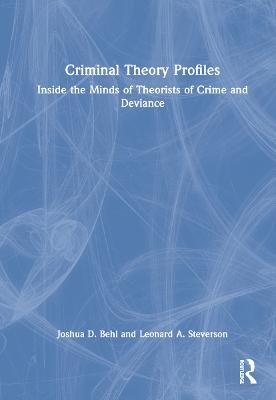
Criminal Theory Profiles
Routledge (Verlag)
978-0-367-47814-8 (ISBN)
Criminology is based on strong theoretical foundations that attempt to answer the question of why people commit crime. Criminological theory is especially complex in that theorists come from a variety of disciplines including medicine, sociology, psychology, economics, and law. While not an exhaustive list of each theorist’s works, nor an in-depth review of the empirical work that has been done on each theory, this text tracks the intellectual development of a theory by profiling the theorists who are responsible for the major ideas in criminological thought. By viewing the field in the context of the social conditions of the time and the personal histories of the theorists, students can better understand the intellectual history of each theory and the relationship between criminology and other fields, to grasp a better appreciation of how the science of crime and the study of criminals has evolved.
All chapters are organized with a brief overview of the theorist and their significant ideas, a biographical profile of the theorist, coverage of the theoretical developments and contributions of the theorist, a list of major works by the theorist, and a summary detailing the overall legacy of the theorist in the field. This book is ideal for courses on criminology, criminological theory, and criminal behavior.
Joshua D. Behl, Ph.D., is an assistant professor of criminology at Flagler College in Saint Augustine, Florida. He has a B.A. and M.A. in Criminology and a Ph.D. in Criminology, Law, and Society from the University of Florida. He teaches Criminological Theories, Sociology of Law, and Psychology and Law. He has also authored and co-authored empirical articles, encyclopedia chapters, and books reviews. When not teaching, Dr. Behl enjoys sharing his research with practitioners and attorneys in his role as a litigation consultant. Leonard A. Steverson, Ph.D., is associate professor emeritus of sociology at South Georgia State College and currently an adjunct professor of sociology at Flagler College in Florida. He has a B.S and M.S. in Sociology and a Ph.D. in Human Services. He has authored three books, co-authored two more, and contributed seven chapters in edited volumes. His publications include Policing in America: A Reference Handbook (ABC-CLIO, 2007), Debating Social Problems (with Jennifer E. Melvin, Routledge, 2018), Madness Reimagined: Envisioning a Better System of Mental Health in America (Vernon Press, 2018), and Addiction Reimagined: Challenging Views of an Enduring Social Problem (Vernon Press, 2020). In addition to a long academic career, he has worked as a mental health and substance abuse program director, a correctional counselor, and probation officer.
Introduction; 2. Foundations in Criminology and the Sociology of Deviance; 3. Crime Prevention; 4. Theories of Social Control; 5. Learning Theories; 6. Anomie and Strain Theories; 7. Social Disorganization; 8. Societal Reactions and Labeling of Deviance; 9. Conflict Theories; 10. Gender and Crime; 11. Race and Crime; 12. Crime over the Life Course
| Erscheinungsdatum | 27.09.2021 |
|---|---|
| Verlagsort | London |
| Sprache | englisch |
| Maße | 178 x 254 mm |
| Gewicht | 444 g |
| Themenwelt | Geisteswissenschaften ► Psychologie |
| Recht / Steuern ► Strafrecht ► Kriminologie | |
| ISBN-10 | 0-367-47814-5 / 0367478145 |
| ISBN-13 | 978-0-367-47814-8 / 9780367478148 |
| Zustand | Neuware |
| Haben Sie eine Frage zum Produkt? |
aus dem Bereich


